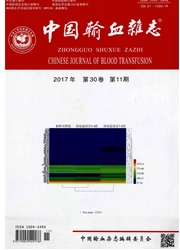

 中文摘要:
中文摘要:
目的:探讨负载自身肿瘤裂解物的树突状细胞(DC)与细胞因子诱导的杀伤细胞(CIK)共培养后,对CIK体外肿瘤细胞杀伤活性的影响,进一步观察负载自身肿瘤裂解物的DC联合CIK治疗乳腺癌患者的临床免疫学疗效、毒副反应。方法:选择20例乳腺癌患者,分离外周血单个核细胞,其中贴壁细胞经GM—CSF和IL-4诱导产生DC,并负载自体肿瘤细胞裂解物;悬浮细胞经IFN-γ、IL-2、抗CD3单抗、IL-1α体外诱导产生CIK细胞。将负载抗原的DC与CIK共培养,观察CIK在体外对自身肿瘤细胞和乳腺癌细胞株SKBR-3的杀伤活性。此外,20例患者在切除原发病灶后,接受Ag—DC+CIK细胞的过继免疫治疗,观察临床免疫疗效。结果:①CIK细胞培养后可见CD3^+、CD8^+和CD3^+CD56^+细胞较培养前显著增加;②将负载自身肿瘤抗原的DC与CIK共培养后,CIK的体外特异性和非特异性杀瘤活性明显提高;③细胞治疗后患者外周淋巴细胞Ag—NORs的IS值明显增高;CD3^+、CD8^+、CD56^+升高;PBMC对自身肿瘤细胞的杀伤活性增强(P〈0.05);④除一过性发热、畏寒外未见其它不良反应。结论:负载自体肿瘤细胞裂解物的DC疫苗联合CIK细胞在体外能明显增强对乳腺癌细胞的杀伤作用,亦能增强乳腺癌患者的细胞免疫功能,取得较理想的临床免疫疗效。
 英文摘要:
英文摘要:
Objective:To investigate the killing activity of cytokine -induced killer (CIK)cells after incubated with autologous tumor cell lysate -pulsed dendritic cells (DC), furthermore, to evaluate the clinical efficacy and side effect of autologous tumor cell lysate -loaded DC in combination with CIK on breast cancer. Methods:Peripheral blood mononuclear cells (PBMC) were isolated from 20 patients with breast cancer, and cultured with granulocyte -macrophage colony-stimulating factor (GM-CSF) and interleukin-4 (IL-4) to produce DC. The DC were pulsed with autologous tumor cell lysate. T lymphocytes from PBMC were cultured with interferon-γ (IFN-γ), IL-2, CD3-moAb, and IL-1α to prepare CIK. The killing activity of CIK on autogenous breast cancer cell and SKBR-3 was investigated after CIK was incubated with autologous tumor cell lysate-pulsed DC. Moreover, after radical mastectomy, the 20 patients received the immunotherapy of DC and CIK. Clinical and immunologic responses were evaluated. Results :The killing activity of CIK was improved remarkably after CIK was incubated with autologous tumor cell lysate -pulsed DC, meanwhile, the immunotherapy of DC and CIK can alleviate symptoms and improve immune functions of the patients. Except transient fever and chili, no remarkable adverse event happened during or after the treatment. Conclusion:Autologous tumor cell lysate-pulsed DC in combination with CIK shows short-term efficacy on breast cancers through inducing specific antitumor immunity, and can be an effective adjuvant to the routine therapy of breast cancers.
 同期刊论文项目
同期刊论文项目
 同项目期刊论文
同项目期刊论文
 期刊信息
期刊信息
